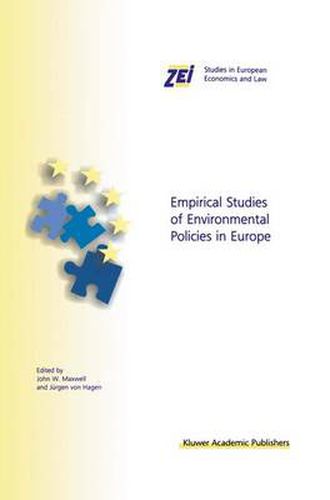Readings Newsletter
Become a Readings Member to make your shopping experience even easier.
Sign in or sign up for free!
You’re not far away from qualifying for FREE standard shipping within Australia
You’ve qualified for FREE standard shipping within Australia
The cart is loading…






This title is printed to order. This book may have been self-published. If so, we cannot guarantee the quality of the content. In the main most books will have gone through the editing process however some may not. We therefore suggest that you be aware of this before ordering this book. If in doubt check either the author or publisher’s details as we are unable to accept any returns unless they are faulty. Please contact us if you have any questions.
The visible encroachment of industrial development on the environment, and its unintended consequences, has increased public demand for better environmental management and policy. As policy makers struggle to meet these demands, empirical analysis of the effects of environmental policies is crucial for guiding the development, implementation and evaluation of alternative government interventions and regulatory approaches. Such analysis is scarce, however. The need for empirical studies is particularly large in Europe, where environmental policy debates are still mainly theoretical and tend to reflect different ideological positions more than informed assessments of alternative policies. This study presents contributions on empirical environmental policy evaluation. The individual chapters, written by authors from Europe and the US, contain quantitative studies of proposed and implemented environmental policies, at both the micro- and macroeconomic levels. The policy issues studied in this volume include the double dividend-hypothesis of carbon taxation, the political economy of environmental policy development, the voluntary environmental efforts of corporations, the enforcement of environmental regulations, the development of environmental policies in transition economies and the implementation of environmental policies in the face of transboundary pollution.
$9.00 standard shipping within Australia
FREE standard shipping within Australia for orders over $100.00
Express & International shipping calculated at checkout
This title is printed to order. This book may have been self-published. If so, we cannot guarantee the quality of the content. In the main most books will have gone through the editing process however some may not. We therefore suggest that you be aware of this before ordering this book. If in doubt check either the author or publisher’s details as we are unable to accept any returns unless they are faulty. Please contact us if you have any questions.
The visible encroachment of industrial development on the environment, and its unintended consequences, has increased public demand for better environmental management and policy. As policy makers struggle to meet these demands, empirical analysis of the effects of environmental policies is crucial for guiding the development, implementation and evaluation of alternative government interventions and regulatory approaches. Such analysis is scarce, however. The need for empirical studies is particularly large in Europe, where environmental policy debates are still mainly theoretical and tend to reflect different ideological positions more than informed assessments of alternative policies. This study presents contributions on empirical environmental policy evaluation. The individual chapters, written by authors from Europe and the US, contain quantitative studies of proposed and implemented environmental policies, at both the micro- and macroeconomic levels. The policy issues studied in this volume include the double dividend-hypothesis of carbon taxation, the political economy of environmental policy development, the voluntary environmental efforts of corporations, the enforcement of environmental regulations, the development of environmental policies in transition economies and the implementation of environmental policies in the face of transboundary pollution.